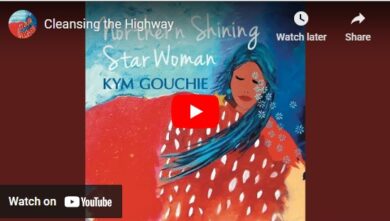Celebrated Lheidli T’enneh Nation artist, storyteller, cultural ambassador, and respected elder-in-training Kym Gouchie’s new album Shun beh nats’ujeh (We Are Healing Through Songs) features everything from soul-soothing lullabies to barn-burners to Indigenous chanting. In 2019, Gouchie won the prestigious Stingray Rising Star Award, two years after releasing Northern Shining Star Woman.
On Shun beh nats’ujeh, Gouchie, whose family tree connects Lheidli T’enneh, Secwépemc, Cree, and European lineage, seamlessly switches between singing in her ancestral languages and English. We Are Healing Through Songs is a family-oriented album for listeners of all ages – which comes as no surprise, given Gouchie’s roles as a devoted daughter, mother, and grandmother, along with being a tireless voice within her Lheidli T’enneh community. Of her home, she says, “I’m of the people from where the two rivers meet. This is who I am. This is where I live. It’s also called Prince George.”
Gouchie’s family both influence and appear on Shun beh nats’ujeh. “Heartbeat” was inspired by the sound of her mother’s heart during an echocardiogram. “I was able to get some of my mom’s heartbeat in there, so it truly represents my grandmothers and that whole lineage of where that heartbeat originates,” she says. But her mother’s heart wasn’t the only body part featured on this song. “I don’t know if you can hear this,” Gouchie says while producing a percussive tone reminiscent of Dolly Parton’s iconic song, “9 to 5.” “Those are my fingernails. I’m just rubbing them together. They sound like a washboard.”
Gouchie was sure to include her mother’s ancestral language Secwepemctsin (Shuswap), which she only recalls hearing her great-grandmother speak. “None of my grandparents spoke it,” she says. “My mother never spoke it. It was lost. People hid the fact that they were Indigenous because it was what you did. It was not good to identify as a Native person back in the day.” In “Heartbeat,” Gouchie is essentially singing, “I love you, mom.”
In “Atsoo Shun,” Gouchie celebrates the wisdom of elders, Indigenous heritage, and the unbreakable bond between generations. The recording features her great-niece Brooklyn Tomlinson, and Gouchie’s late paternal grandmother, Granny Mary Gouchie, who helped with translation. The song’s heartwarming lyrics, translated from the Dakelh (Carrier) language, evoke a sense of community and connection to the land: “It’s a beautiful day and we’re all together. We’re hunting, we’re fishing, and we’re picking berries.”
Gouchie’s rich, clarinet-like voice boosts the already jubilant “I Heard a Raven.” The song contains one lyrical line – a slight expansion of the track’s title – and it’s a total earworm. Gouchie says, “I was walking through a parking lot in downtown Prince George, and I heard somebody go, ‘Hello.’ I looked around and there was nobody there.” She thought someone was pranking her until she observed a raven looking at her with its head cocked. Then the massive bird said hello in a human-like voice. “I’ve had these moments with animals where I feel like there is no barrier there,” she says. “We are the same. We are all a part of this great creation of life. I just felt like my spirit was that raven.”
“Gratitude,” features Nehiyaw/Métis rapper EarthChild (Travis Hebert) from Witset First Nation in central BC. Gouchie was inspired by the Indigenous word “snachailya,” which closely translates to “You have reached into my chest, and you’ve touched my heart.” Gouchie wrote the song, but left it in the capable hands of her collaborators: EarthChild, who penned powerful rhymes; her producer and project manager Dan Barton, who played drums, ukulele, and percussion; and Elijah Quinn, who played clavinet and acoustic and electric guitars.
The emotionally complex “215+” came to Gouchie shortly after the announcement of the graves containing the remains of 215 Indigenous children at the former Kamloops Indian Residential School. “That song just fell out at me,” she says. “I was driving down the highway sobbing and singing ‘Hallelujah.’ I knew I wanted to put this out there so people can connect, and hopefully grieve, and start to want to understand.”
Gouchie, who says she receives her songs as gifts, doesn’t over-analyze her lyrics. Still, asked about the use of the word “Hallelujah,” she says, “I think it’s because of what was drilled into those little minds. It was a word that would have been in their vocabulary, even with their broken English of what was beaten out of them. That word represents the church. It represents the loss of language, and the simplicity and power and elation of that word, and just trying to embody the way the sound came. It [the song] was a gift.”
Gouchie also gifts her songs to others. While working with The Prince George Tapestry Singers, they asked her how to do a land acknowledgement that didn’t feel like a checked box. Gouchie told them, “You’re a choir. You can sing it.” The first verse of what became “Territory Welcome Song” poured out of Gouchie on her drive home. “It was totally in line with what needed to happen,” she says. “I have gifted the use of that song to the Tapestry Singers, and they sing it at the beginning of every performance. Now the schools are teaching it, and they start their assemblies with it.” Gouchie, who is often called upon to perform at welcoming ceremonies and cultural gatherings, always starts with “Territory Welcome Song” but changes the words according to context.
Gouchie’s album, Shun beh nats’ujeh, is also a gift, offering a transformative experience that showcases the healing power of music, and invites listeners to embrace the joyful spirit of childhood that resonates within us all.

